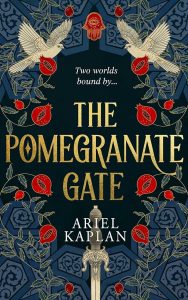Caren Gussoff Sumption Reviews The Pomegranate Gate by Ariel Kaplan
 The Pomegranate Gate, Ariel Kaplan (Rebellion 978-1786188243, £18.99, 512pp, hc) July 2023. (Erewhon 978-1645660576, $27.00, 576pp, hc) September 2023.
The Pomegranate Gate, Ariel Kaplan (Rebellion 978-1786188243, £18.99, 512pp, hc) July 2023. (Erewhon 978-1645660576, $27.00, 576pp, hc) September 2023.
Young-adult author Ariel Kaplan’s first adult novel, The Pomegranate Gate, is a sprawling fantasy epic that brings Jewish Kabbalistic mysticism into an immersive, alternative-Earth version of the Inquisición española. Toba Peres and Naftaly Cresques, two twenty-somethings, are the unlikely seeming heroes of the novel and, at first meeting, seem hardly capable of even the mundane. Intellectual Toba has suffered ill health her whole life, and Naftaly, awkward and clumsy, is the least-talented tailor in the region. The talents they do have – Toba, simultaneously translating two languages, writing one with each hand, and Naftaly’s seemingly prophetic dreams – are useless in their world, and even reviled. This all changes after the Queen of Sefarad demands that all Jewish families either convert to Christianity, flee without all valuables, or die.
Toba and Naftaly do attempt to flee with several other people from their village: Toba with her headstrong grandmother and dreamy-headed grandfather; the recently orphaned Naftaly and an elderly companion who’s adopted him along the way. The journey is perilous, as thieves take advantage of the fleeing Jews who just may be attempting to smuggle their hard-earned possessions with them. And both Toba and Naftaly have secreted away precious items – Toba has sewn into her dress an elaborate amulet she’s worn since childhood, and Naftaly, a sealed book his father, before his death, instructed him to protect at all costs. Bandits set upon Toba, who, in her weakened state, falls behind the caravan, and Naftaly stays behind to try and save her. They both become separated from the rest of the villagers, and both find themselves at the foot of a strange gate set amongst pomegranate trees. Toba passes through the gate, chasing two mysterious men who saved her from both the thieves and a pack of wolves, while Naftaly stays behind, after realizing he’s now, magically, more than 50 miles off course.
Of the two main characters, we wind up spending much more time with Toba, who has entered the Mirror Realm (the name of the series of which The Pomegranate Gate is book one) through that pomegranate gate. The Mirror Realm is populated by humanoid beings called the Mazik, square-pupiled and magic-using, who have a complicated relationship with the human realm. Toba, now trapped in the Mirror Realm until the next full moon, finds refuge in the ruined estate of a Mazik scholar, the serious, troubled Asmel, and his heir, the handsome, sarcastic Barsilay. It’s dangerous for the two to harbor a human – their land is also besieged by political troubles caused by a coup years previously. All three are shocked to learn that Toba herself has magical abilities – as well as Mazik blood and a direct connection to both Asmel and Barsilay.
Meanwhile, Naftaly has joined both his nameless elderly companion and Toba’s grandmother in an attempt to find the missing Toba. Using his dreams, which turn out to be less prophetic and more a way for him to interact with the Mazik world and its inhabitants, Naftaly winds up as embroiled as Toba in Mazik intrigue and danger, and the fate of both their worlds lays heavily and squarely on both their shoulders.
The Pomegranate Gate is far from a perfect book. The plot strains a bit under the weight of worldbuilding and historical context. Action is diffusely spread amongst pages and pages of exposition. Naftaly, for all his gawkish charm, stars in the less compelling chapters, and some of the danger he and his companions face feel like they have been placed in danger to simply have something to do while Toba has the interesting, magical adventures (including accidentally birthing a second version of herself). I suspect there will be a grand payoff, though; this book is the first in a series, after all.
The strength, however, that shines through even the slower paced parts is the presence of Judaism in its various forms. As a Hiloni (nonreligious but culturally Jewish) person, it’s rare that I see Jewishness explicitly used in fantasy. There are many books that may code a people or culture as having elements pulled from Judaism, but the world of The Pomegranate Gate is unmistakably Jewish, and the characters are unmistakably Jewish. In action, in language, in their beliefs. The setting and background conflict, though in and of a created fantasy world, directly draws from European Jewish history. Many of the fantastic elements are pulled straight from Jewish mysticism. It’s empowering to see one’s culture portrayed honestly and with care and respect, especially in the political climate of our world with increasing antisemitic sentiment rising again, at least in the Western world. The Pomegranate Gate may be slow and a bit rocky at times, but it is a refreshing, promising opening to an interesting new series.
Caren Gussoff Sumption is a writer, editor, Tarot reader, and reseller living outside Seattle, WA with her husband, the artist and data scientist, Chris Sumption, and their ridiculously spoiled cat-children.
Born in New York, she attended the University of Colorado, the School of the Art Institute of Chicago, Clarion West (as the Carl Brandon Society’s Octavia Butler scholar) and the Launchpad Astronomy Workshop. Caren is also a Hedgebrook alum (2010, 2016). She started writing fiction and teaching professionally in 2000, with the publication of her first novel, Homecoming.
Caren is a big, fat feminist killjoy of Jewish and Romany heritages. She loves serial commas, quadruple espressos, knitting, the new golden age of television, and over-analyzing things. Her turn offs include ear infections, black mold, and raisins in oatmeal cookies.
This review and more like it in the October 2023 issue of Locus.
 While you are here, please take a moment to support Locus with a one-time or recurring donation. We rely on reader donations to keep the magazine and site going, and would like to keep the site paywall free, but WE NEED YOUR FINANCIAL SUPPORT to continue quality coverage of the science fiction and fantasy field.
While you are here, please take a moment to support Locus with a one-time or recurring donation. We rely on reader donations to keep the magazine and site going, and would like to keep the site paywall free, but WE NEED YOUR FINANCIAL SUPPORT to continue quality coverage of the science fiction and fantasy field.
©Locus Magazine. Copyrighted material may not be republished without permission of LSFF.






